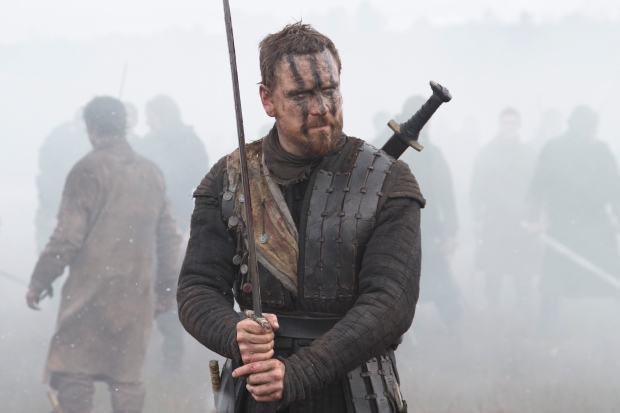Who goes to big-screen Shakespeare? Not theatre-goers much, and with reason. Apart from the odd corker by Kurosawa, arguably Olivier and Orson Welles — and let’s bung in Zeffirelli for those with a sweeter tooth — the Bard is a better scriptwriter when the words are dumped and the plots he nicked from elsewhere are updated. See 10 Things I Hate About You (the Shrew as high-school comedy), Forbidden Planet (Prospero in outer space) and, best of all, West Side Story (in fair Manhattan where we lay our scene).
There is, as it happens, a semi-respected English-language version of Macbeth by Roman Polanski, who used the cloak of art to get Lady M’s kit off (in his diaries, Kenneth Tynan perved over Francesca Annis’s ‘fesses tristes’). The makers of this new one feel the play’s time has come again and the production notes burble about greed being very this season. The actual film has no such thought in its head nor, come to that, many others either.
The compelling case for another crack at Macbeth is staring us all in the face, surely. The story of Scotland ripped to shreds by factional chiefs and ambitious leaderenes is still breaking news. But that subtext seems to have evaded the attention of Australian director Justin Kurzel, whose calling card is Snowtown (2011), in which a teenage serial killer goes a-dicing in a nastier part of Adelaide. His Macbeth is sort of the same, plus horizontal rain and naturally occurring dry ice. And actors you’d buy a ticket to see.
Aside from its Aussie director, the Scots Nats may also come knocking on the door of the casting director, who has Macbeth played by a German Irishman (Michael Fassbender), Lady Macbeth by a Frenchwoman (Marion Cotillard), Duncan, Banquo and Macduff by Englishmen and Lady Macduff by an Australian Pole. At least the witches are locally sourced, and the spear-carriers. The location scouts might also want to watch their backs: the king’s castle atop the dunes is Bamburgh in Northumberland, and the coronation is in Ely Cathedral.
Outdoors it’s a different picture. The Highlands’ quags and crags are much admired by wide-eyed cinematographer Adam Arkapaw. It all looks horridly magnificent, if grimly colourless. No fervent woad is daubed on these bravehearts’ mugs, just mud and blood and black vertical stripes like prison bars (although Lady M wears a weird swoosh of sky-blue eye shadow from temple to temple in the banquet scene). Colour washes over the screen only in a spectacular amber sunset and then in an orange conflagration at the final, poorly attended battle.
The real problem occurs whenever anyone opens their mouth to speak. A choice has been made to siphon the oratorical flourishes out of the verse. The result is a lot of iambic pentameter with the dial turned down to minus 11. Even in a howling gale Fassbender mutters his lo-fi lines as if determined not to be fruity. Lady M murmurs about decapitating the monarchy as if hatching a plan to file her nails or her tax return. All this introversion is literally monotonous and, whisper it softly, a bit soporific. When Macduff hollers ‘Awake!’ upon discovering Duncan’s corpse, it’s like an alarm clock going off.
That said, blood spits and spatters, and blades pierce flesh with a fortissimo whoomph. Much knifework has also, necessarily, been visited on the text (Shakespeare shares his writing credit with three other persons), including the odd canonical line: ‘Give me the daggers’ has been culled, fatally weakening the idea of Lady Macbeth as the real monster; she even gets feebly triste when her husband torches the Macduff bairns.
The rethink offers up some potential essay topics for GCSE first-timers. Lady Macbeth screws Macbeth’s ‘courage to the sticking-place’ by submitting to an upright shag (‘I am settled,’ determines the Thane of Cawdor upon shooting his wad). The dagger he sees before him is handed to him by an apparition. Lady Macbeth’s madness is spoken to the vision of the dead toddler whose brains she’d happily dash out, incinerated at the start of the film. Birnham Wood comes to Dunsinane in flying sparks and wind-blown embers. And finally, little Fleance returns to take up a sword and prosecute Scottish schism into the future.
But as a psychodrama it’s a bit rock vid — all flames and flashbacks, slo-mos, jump cuts and overdubs, with the weird sisters astride the heather like a ragged-trousered Bananarama. Nothing like enough is made of Cotillard’s otherness as a French import à la Mary Queen of Scots, while the film is far too enthralled by Fassbender’s animal magnetism to make any profound enquiry into what oils Macbeth’s cogs. Alas, what’s done cannot be undone.






Comments